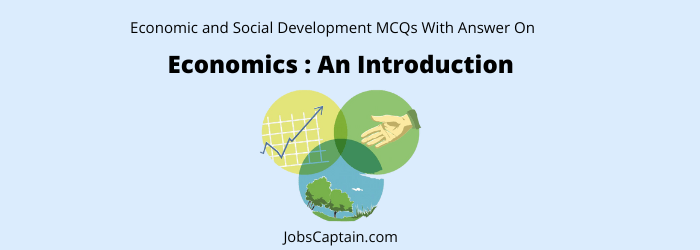
This blog post contains a multiple choice quiz on economics. The quiz is designed to test your knowledge of key concepts in economics.
| Return To | Economic and Social Development MCQ | |
Question 1: Who is called father of Modern Economics?
(A) Adam Smith
(B) Marshal
(C) Keynes
(D) Robins
Question 2: Paul Krugaman is a/an ___________.
(A) Scientist
(B) Sportsman
(C) Banker
(D) Economist
Question 3: For the existence of a market which is indispensable?
(A) Banks
(B) Economic laws
(C) Prices
(D) Trade unions
Question 4: Indian Economy is characterised as __________.
(A) Backward economy
(B) developed economy
(C) developing economy
(D) underdeveloped economy
Question 5: The Gandhian economy is based on the principle of ____________.
(A) Competition
(B) Trusteeship
(C) State control
(D) None of the above
Question 6: Who among the following had propounded the concept of ‘Trusteeship’?
(A) M.N. Roy
(B) Aurobindo Ghosh
(C) Mahatma Gandhi
(D) G.K. Gokhale
Question 7: Which one of the following is the major feature of the Indian Economy?
(A) A capitalist economy
(B) A socialist economy
(C) A mixed economy
(D) None of the above
Question 8: The Indian Economy is a ____________.
(A) Liberal economy
(B) Socialist economy
(C) Mixed economy
(D) None of the above
Question 9: Mixed economy in India means _____________.
(A) Co-existence of large and small scale industries
(B) Foreign collaboration in economic development
(C) Co-existence of public and private sector
(D) None of the above
Question 10: The credit of developing the concept of modern economic growth goes to _________.
(A) Arthur Lewis
(B) Michael P. Todaro
(C) Gunnar Myrda
(D) Simon Kuznet
Question 11: ‘Underdeveloped countries are the slums of world economy’ the statement is given by _________.
(A) Ragnar Nurkse
(B) A.N. Cairncross
(C) Colin Clark
(D) Jagdish Bhagwati
Question 12: . Which among the following is a characteristic of underdevelopment?
(A) Vicious circle of poverty
(B) Raising mass consumption
(C) Growth of industries
(D) High rate of urbanisation
Question 13: Economically, one of the results of the British rule in India in the 19th century was the _________.
(A) increase in the export of Indian handicrafts
(B) growth in the number of Indian owned factories
(C) commercialisation of Indian agriculture
(D) rapid increase in the urban population
Question 14:
- Assertion (A): The emergence of economic globalism does not imply the decline of socialist ideology.
- Reason (R): The ideology of socialism believes in universalism and globalism.
In the context of the given two statements, which of the following is correct?
(A) Both (A) and (R) are true and (R) is the correct explanation of (A)
(B) Both (A) and (R) are true, but (R) is not the correct explanation of (A)
(C) (A) is true, but (R) is false
(D) (A) is false, but (R) is true
| Return To | Economic and Social Development MCQ | |
